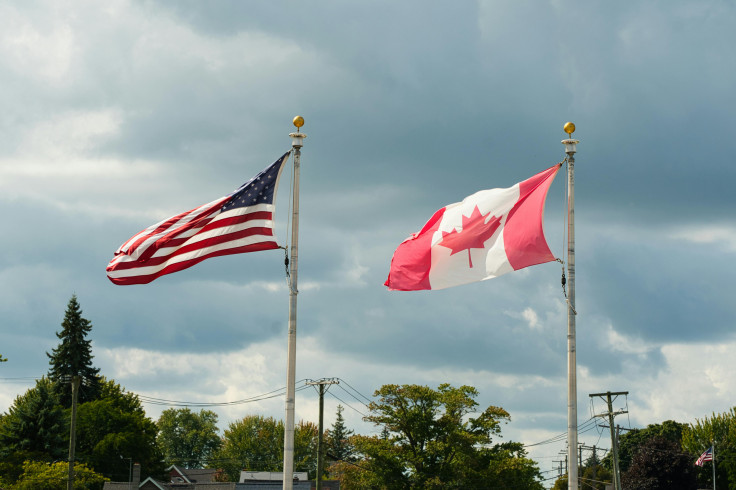Outrage as Food Delivery Driver 'Deported' to El Salvador After Inadvertent Turn at US–Canada Border
Immigration rights advocates have expressed serious concerns over his deportation and the lack of due process

Anger is mounting against immigration authorities following the deportation of a food delivery driver who accidentally crossed into Canada via the Ambassador Bridge.
The 32-year-old Venezuelan national, Ricardo Prada Vásquez, was reportedly making a routine food delivery in January when a wrong turn landed him on the Ambassador Bridge, inadvertently crossing into Canadian territory.
A Mistake With Devastating Consequences
The incident occurred after Vásquez picked up an order from McDonald's. While en route to the customer, he mistakenly entered the bridge that connects Detroit, Michigan to Windsor, Ontario. Though locals familiar with the area acknowledge that this mistake is relatively common—even among residents—it proved disastrous for Vásquez. His misstep resulted in his detention and, ultimately, deportation to El Salvador.
As first reported by The New York Times, Vásquez was apprehended on 15 January while attempting to re-enter the United States through the Detroit-Windsor Tunnel. He was then taken into custody by US immigration officials.
'We're concerned that, again, a wrong turn at the border really shouldn't mean that our neighbours are disappearing,' said Christine Sauve, policy engagement and communications manager at the Michigan Immigrant Rights Center.
Se llama Ricardo Prada.
— LaIguanaTV (@la_iguanatv) April 23, 2025
Designada fiscalía especializada para investigar desaparición forzada de ciudadano venezolano deportado de EEUU. pic.twitter.com/MUF2uWagg8
Homeland Security Confirms Deportation
On Tuesday, the Department of Homeland Security (DHS) confirmed via social media that Vásquez was deported to El Salvador on 15 March. The department also disputed the New York Times' claim that he was not on the list of individuals deported to that country.
Friend Of Deported Man Reveals Fearing Reprisal
Vásquez reportedly informed a friend in Chicago that he was among several detainees in Texas who anticipated being sent back to Venezuela. That same evening, the Trump administration arranged for three planes carrying Venezuelan migrants to be flown from the Texas facility to El Salvador.
They remained confined in a high-security prison, with no allowed contact with the outside. However, the NYT report suggested Vásquez was neither heard from nor seen. His name was absent from a list of 238 individuals deported to El Salvador that day. Furthermore, he was not visible in the photos and videos released by authorities, which showed shackled men with shaved heads.
'He has simply disappeared,' stated Javier, a friend in Chicago and the last person to communicate with Vásquez. The friend spoke about Vásquez on the condition of being identified solely by his middle name, fearing potential targeting by immigration officials.
According to the department, Vásquez belonged to a criminal group known as Tren de Aragua. They also accuse him of entering the United States through the Brownsville, Texas, Port of Entry on 29 November 2024.
#23Abr #EEUU #Migrantes
— Reporte Ya (@ReporteYa) April 23, 2025
Ministerio Público investiga la desaparición del migrante venezolano Ricardo Prada (32), quien fue detenido en EE. UU. en enero y desde el #15Mar se desconoce su paradero.
La fiscalía habla de posible desaparición forzada y cita un reporte del NYT. -... pic.twitter.com/cLMC7pGkqJ
Immigration Experts Alarmed by Lack of Due Process
Immigration rights advocates, including Sauve, have expressed growing concern over the pattern of deportations occurring without what they believe to be adequate legal review or oversight.
'We've seen long-term detentions where they shouldn't be happening, and there's no oversight or body to look into these matters and investigate them. All persons in the United States, regardless of their immigration status, no matter who they are or where they're from, have rights to due process,' Sauve added.
The Michigan Immigrant Rights Center, the ACLU, and Congresswoman Rashida Tlaib are expected to hold a press conference to address the increasing number of immigrant detentions and disappearances along the US-Canada border.
Pattern Emerges at Ambassador Bridge
Last month, a similar case emerged when a Guatemalan mother, undocumented in the United States, also accidentally drove onto the Ambassador Bridge. According to her attorney, she and her two daughters were immediately detained by US Customs and Border Protection upon reaching the checkpoint. The mother and her children remain in federal custody.
These incidents have sparked renewed scrutiny of the border crossing protocols and intensified calls for immigration reform, particularly regarding how accidental or unintentional border infractions are handled by US authorities.
© Copyright IBTimes 2025. All rights reserved.






















